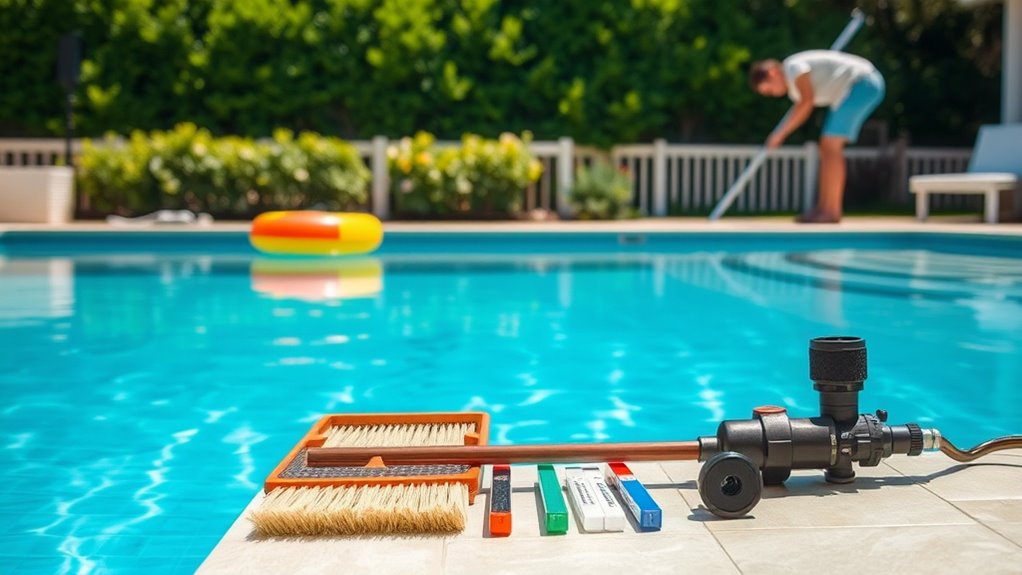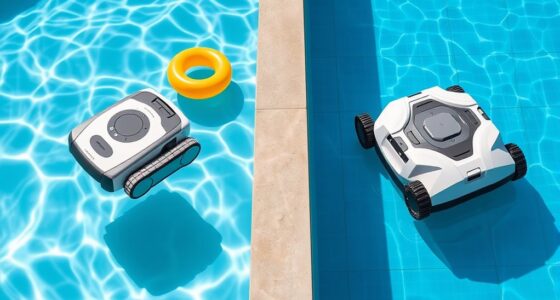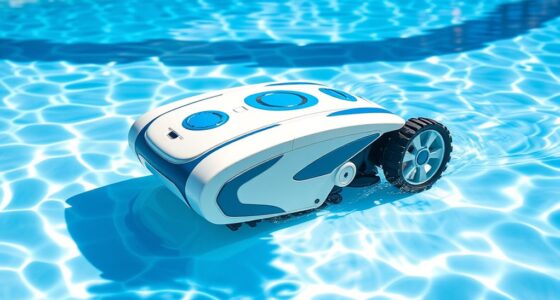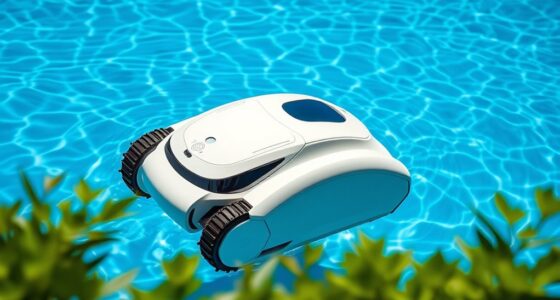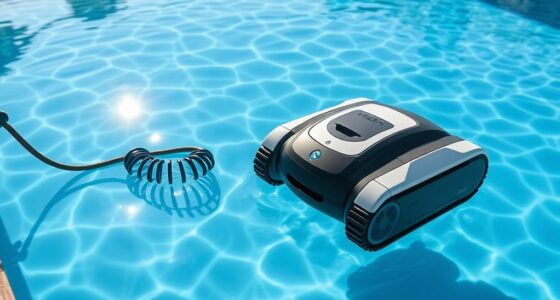To extend your pool’s life, prioritize regular preventative maintenance. Check and balance chemicals weekly, inspect and clean filters, skimming debris and vaccuming the pool. Keep an eye on equipment for signs of wear and repair issues early. Maintain surrounding areas and use pool covers to prevent debris buildup. Staying consistent with these steps helps avoid costly repairs and keeps your pool in top condition. Keep going to discover more tips for a long-lasting pool.
Key Takeaways
- Perform regular chemical balancing to prevent algae growth and maintain water clarity.
- Conduct routine cleaning of surfaces, filters, and debris to reduce strain and prolong equipment lifespan.
- Inspect and maintain pool equipment regularly to catch issues early and prevent costly repairs.
- Keep surrounding areas clean and use covers to minimize debris and chemical demand.
- Follow a proactive maintenance schedule to ensure optimal water quality and extend pool longevity.

Have you ever wondered what it takes to keep your pool clean and inviting all season long? The secret lies in consistent preventative maintenance. Regular pool cleaning isn’t just about skimming leaves or brushing the walls; it’s about keeping every component in top shape, so your pool remains crystal clear and safe to swim in. One of the most critical aspects is chemical balancing. When your pool’s chemicals are properly balanced, algae and bacteria have no chance to thrive, and your water stays fresh and inviting. Checking and adjusting pH levels, alkalinity, and sanitizer concentration should become part of your weekly routine. Proper chemical balancing also helps prevent corrosion of equipment and surfaces, saving you money on repairs and replacements down the line. Incorporating local building codes and permits considerations ensures your maintenance practices comply with safety standards and prevent future issues.
Beyond chemical balancing, routine pool cleaning involves more than just surface skimming. Regularly vacuum the pool floor and scrub the walls to remove dirt, algae, and buildup. This not only improves water clarity but also reduces strain on your filtration system. A clean filter is essential—be sure to backwash or clean it as recommended by the manufacturer. A clogged or dirty filter can’t effectively trap debris or circulate chemicals, leading to cloudy water and potential damage. Keeping your filter in good shape is an easy way to extend your pool’s lifespan.
Another preventative step is checking your equipment regularly. Inspect your pump, heater, and chlorinator for any signs of wear or leaks. Addressing small issues early prevents them from becoming costly repairs later. Maintaining proper water levels is also crucial—too low, and your pump can run dry; too high, and your skimmers won’t function correctly. Adjusting water levels as needed ensures top-notch circulation and filtration.
Don’t forget to manage the surrounding area. Clear debris from the deck and check for any cracks or damage that could introduce contaminants into your pool. Cover your pool when not in use to prevent debris accumulation and reduce chemical demand. Regularly testing your water with a reliable test kit helps you stay on top of chemical levels, so you can make timely adjustments. Consistency is key—skipping routine checks may lead to cloudy water, algae growth, or equipment failure.
In short, a proactive approach to pool maintenance saves you time, money, and headaches. By committing to regular pool cleaning, diligent chemical balancing, and equipment inspections, you’re not only ensuring your pool looks great but also extending its life for many seasons to come. Proper care today guarantees countless enjoyable swims tomorrow.
Frequently Asked Questions
How Often Should I Replace My Pool’S Filter Cartridge?
You should replace your pool’s filter cartridge when you notice decreased water flow or when filter maintenance becomes difficult. Typically, cartridges last about 1 to 2 years, but this depends on usage and water quality. Regular cleaning can extend the cartridge lifespan, but don’t wait too long to substitute it. Keeping up with filter maintenance ensures your pool stays clean and your filtration system works efficiently.
What’S the Best Way to Prevent Algae Growth?
To prevent algae growth, you should regularly maintain proper chemical balance in your pool, especially pH and chlorine levels. Keep circulation good and clean your filter often to remove algae spores. Using algaecide weekly can boost algae prevention, and brushing pool walls helps disrupt algae buildup. Consistent monitoring and adjusting your chemicals guarantee a healthy, clear pool, making algae less likely to take hold and keeping your swimming enjoyable.
How Can I Detect and Fix Small Leaks Early?
Detecting small leaks early can save you from a pool disaster! Watch for unexplained drops in water level, even if it’s just a tiny inch. Check your pool’s chemical balance regularly, as imbalances can hide leaks. Inspect the skimmer basket and pump area for wet spots or drips. Fix small leaks immediately by tightening fittings or replacing worn parts. Early action keeps your pool sparkling and prevents costly repairs down the line!
What Are Signs My Pool’S Pump Is Failing?
If your pool’s pump is failing, you’ll notice signs like inconsistent water flow, strange noises, or frequent cycling on and off. Keep an eye on your pool equipment and monitor water chemistry, as poor circulation can lead to issues. You might also see increased energy bills or cloudy water. Address these signs promptly to prevent further damage, ensuring your pump operates efficiently and extends the life of your pool.
How Do I Safely Winterize My Pool?
Think of winterizing your pool like preparing a ship for calm seas. Start by cleaning your pool thoroughly, then lower the water level as part of your winter tips. Drain equipment and add winterizing chemicals. Cover your pool securely with pool covers to keep debris out. Store pumps and filters in a dry, protected area. This careful approach helps prevent damage and keeps your pool ready for a smooth restart come spring.
Conclusion
By staying proactive, by performing regular checks, and by addressing issues early, you extend your pool’s life and enhance its enjoyment. Keep your filters clean, your chemical levels balanced, and your equipment inspected. Embrace preventative maintenance as a routine, not a chore. Protect your investment, preserve your pool’s clarity, and enjoy countless seasons of refreshment. When you prioritize maintenance, you guarantee your pool remains a sparkling oasis, ready whenever you want to plunge in and unwind.

